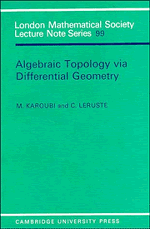Book contents
- Frontmatter
- Contents
- Introduction
- I Algebraic preliminaries
- II Differential forms on an open subset of Rn
- III Differentiable manifolds
- IV De Rham cohomology of differentiable manifolds
- V Computing cohomology
- VI Poincaré duality – Lefschetz' theorem
- Appendix A Stokes' theorem
- Appendix B Chern character and non-commutative De Rham cohomology
- Bibliography
- Index
III - Differentiable manifolds
Published online by Cambridge University Press: 01 March 2011
- Frontmatter
- Contents
- Introduction
- I Algebraic preliminaries
- II Differential forms on an open subset of Rn
- III Differentiable manifolds
- IV De Rham cohomology of differentiable manifolds
- V Computing cohomology
- VI Poincaré duality – Lefschetz' theorem
- Appendix A Stokes' theorem
- Appendix B Chern character and non-commutative De Rham cohomology
- Bibliography
- Index
Summary
The previous chapter was dedicated to open subsets of ℝn: differential forms were defined on them and their De Rham cohomology was introduced. The next chapter will extend these notions to a more general family of mathematical objects: differentiable manifolds.
They are topological spaces which locally look very much like ℝn (Definition 1.1), with a guarantee that the various local images can be put together satisfactorily (Definition 5.2). On such a manifold differential forms can be defined by a ‘patchwork’ method (see Chapter IV) and a notion of De Rham cohomology is obtained in this enlarged setting.
The present chapter gives the necessary definitions together with a list of examples which are intended to show that the notion covers a reasonably wide range of classical cases.
As for these examples, we have aimed at their being as descriptive as possible: we preferred ad hoc proofs, be they lengthy, to references to Big Theories which would have taken us away from our main subject without receiving proper treatment in the process (e.g. the very name of ‘Lie group’ does not appear).
TOPOLOGICAL MANIFOLDS
Definition: Let M be a topological space, n a non-negative integer. We say that M is a topological manifold of dimensdon n (or n-manifold) iff
(i) the topology of M is Hausdorff
(ii) the topology of M has a countable basis, i.e. there exists a countable family F of open subsets of M such that any open subset of M is the union of a subfamily of F: M is then said to be first-countable.
[…]
Information
- Type
- Chapter
- Information
- Algebraic Topology via Differential Geometry , pp. 70 - 120Publisher: Cambridge University PressPrint publication year: 1988
